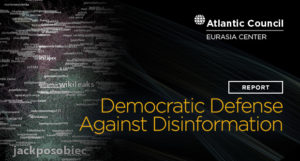Russia is likely to adopt innovative active measures as it seeks to interfere in future elections. Instead of fighting the last war, we should expect a new Kremlin meddling strategy in November, argues analyst John Sipher. As we enter the election season, we should look closely at what Russia is up to in Europe to get a sense of what we can expect, he writes for POLITICO:
Russian operatives are manipulating events in Ukraine, Austria, Germany, the Czech Republic, Montenegro and elsewhere. They fund fringe groups and invest in young leaders in a long-term effort to develop Russian agents who can influence political parties and push a pro-Russian line. We should anticipate the same here. In 2016, the intelligence community uncovered activity by numerous proxy groups working on behalf of Russian intelligence. We should also be aware of what their core special services themselves are up to.
In a bipartisan appeal, U.S. Senators have called for a new cyber-deterrence strategy.
But US election infrastructure is almost no more secure than it was a few years ago, a new report concludes, continuing to sound the alarm ahead of the upcoming midterms, CNN reports:
The report from the Brennan Center for Justice, a division of New York University School of Law that studies democracy and justice issues, looked at the age of voting machines and areas where there’s still a lack of auditing trails for votes, arguing that Congress needs to give states money to update their voting systems and institute voting audits.
 A new report from The Atlantic Council (right) identifies some concrete ways that the United States and Europe can defend against foreign propaganda, disinformation, and election related hacking, notes UN Dispatch’s Mark Leon Goldberg in a podcast on Democratic Defense Against Disinformation:
A new report from The Atlantic Council (right) identifies some concrete ways that the United States and Europe can defend against foreign propaganda, disinformation, and election related hacking, notes UN Dispatch’s Mark Leon Goldberg in a podcast on Democratic Defense Against Disinformation:
On the line with me to discuss this report and its findings is one of the report’s co-authors, Ambassador Daniel Fried. He was a longtime US diplomatic who’s career largely focused Russia and central and eastern Europe. The report was co-authored by Alina Polyakova of the Brookings Institution.
 “We have to fight disinformation within the norms of our government,” said Fried, a board member of the National Endowment for Democracy. “We have options consistent with our values,” he told Polygraph.info (above).
“We have to fight disinformation within the norms of our government,” said Fried, a board member of the National Endowment for Democracy. “We have options consistent with our values,” he told Polygraph.info (above).
In many countries, Facebook is contending with a darkening reputation as a vehicle for disinformation and fake news. The most recent example: Sri Lanka, the New York Times reports:
Freedom House, a Washington-based nonprofit that advocates for free speech and democracy, said in a recent report that “hate speech against minorities continues to foment on various social media platforms, particularly Facebook.” The report said online campaigns targeting Muslims and other minority groups in Sri Lanka had been ongoing since 2013 and had recently increased.
 While propaganda is hardly a new tactic of war, technology has made it easier, faster and more effective. Defending democracy from the dissemination of fake news and disinformation through traditional and social media is a top concern for today’s policymakers, writes B. Rose Kelly of Princeton University’s Woodrow Wilson School of Public and International Affairs.
While propaganda is hardly a new tactic of war, technology has made it easier, faster and more effective. Defending democracy from the dissemination of fake news and disinformation through traditional and social media is a top concern for today’s policymakers, writes B. Rose Kelly of Princeton University’s Woodrow Wilson School of Public and International Affairs.
A daylong conference, “Defending Democracy: Civil and Military Responses to Weaponized Information,” on Saturday, April 7, at Princeton University, will examine disinformation and the widespread digital dispersion of propaganda, she adds:
 This forum comes at a critical time as policymakers think about how to prevent future attacks from Russia and other foreign adversaries. ….The first two panels define the issue: What is the weaponization of information and why is this a threat to the United States? The third panel will consider defense: How can we defend America’s democracy from attacks rendered through disinformation, propaganda and other digital information interference? In the final panel, the focus turns toward deterrence: What measures can the United States take to deter our adversaries from spreading propaganda in the hopes of sowing unrest?
This forum comes at a critical time as policymakers think about how to prevent future attacks from Russia and other foreign adversaries. ….The first two panels define the issue: What is the weaponization of information and why is this a threat to the United States? The third panel will consider defense: How can we defend America’s democracy from attacks rendered through disinformation, propaganda and other digital information interference? In the final panel, the focus turns toward deterrence: What measures can the United States take to deter our adversaries from spreading propaganda in the hopes of sowing unrest?
Panelists hail currently and formerly from the Alliance for Securing Democracy; Arizona State University; Duke University; the Federal Trade Commission; Foreign Policy Research Institute; Georgetown University; Massachusetts Institute of Technology; National Public Radio; National Security Agency; National Security Council… amongst others.
Registration is open to the public.







